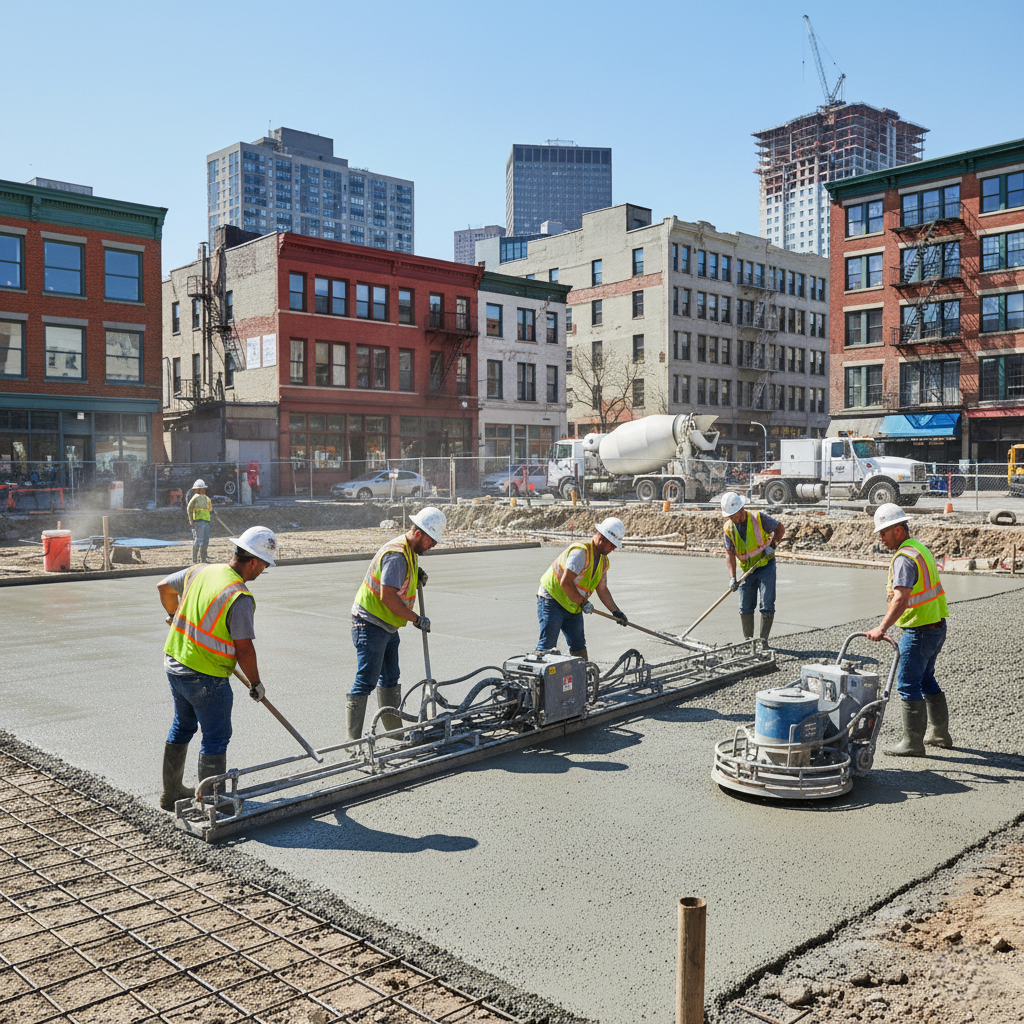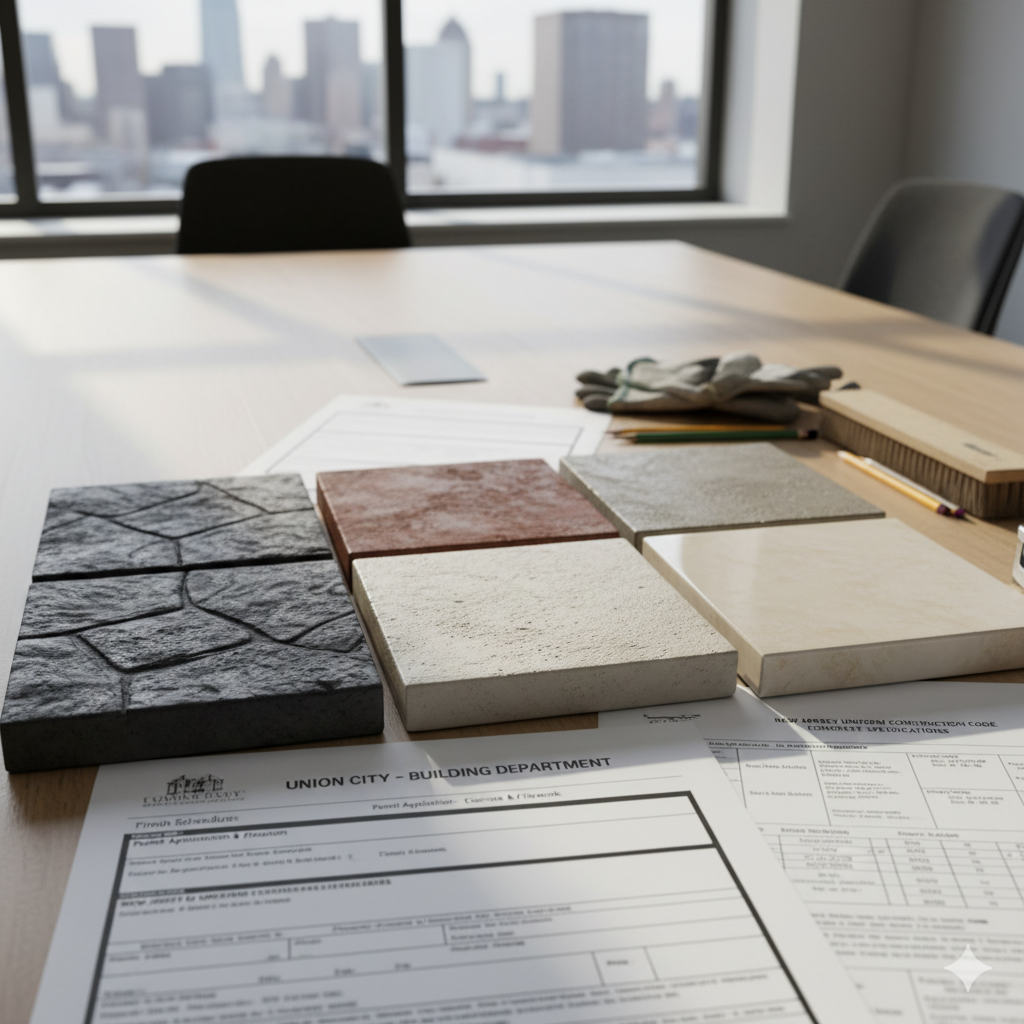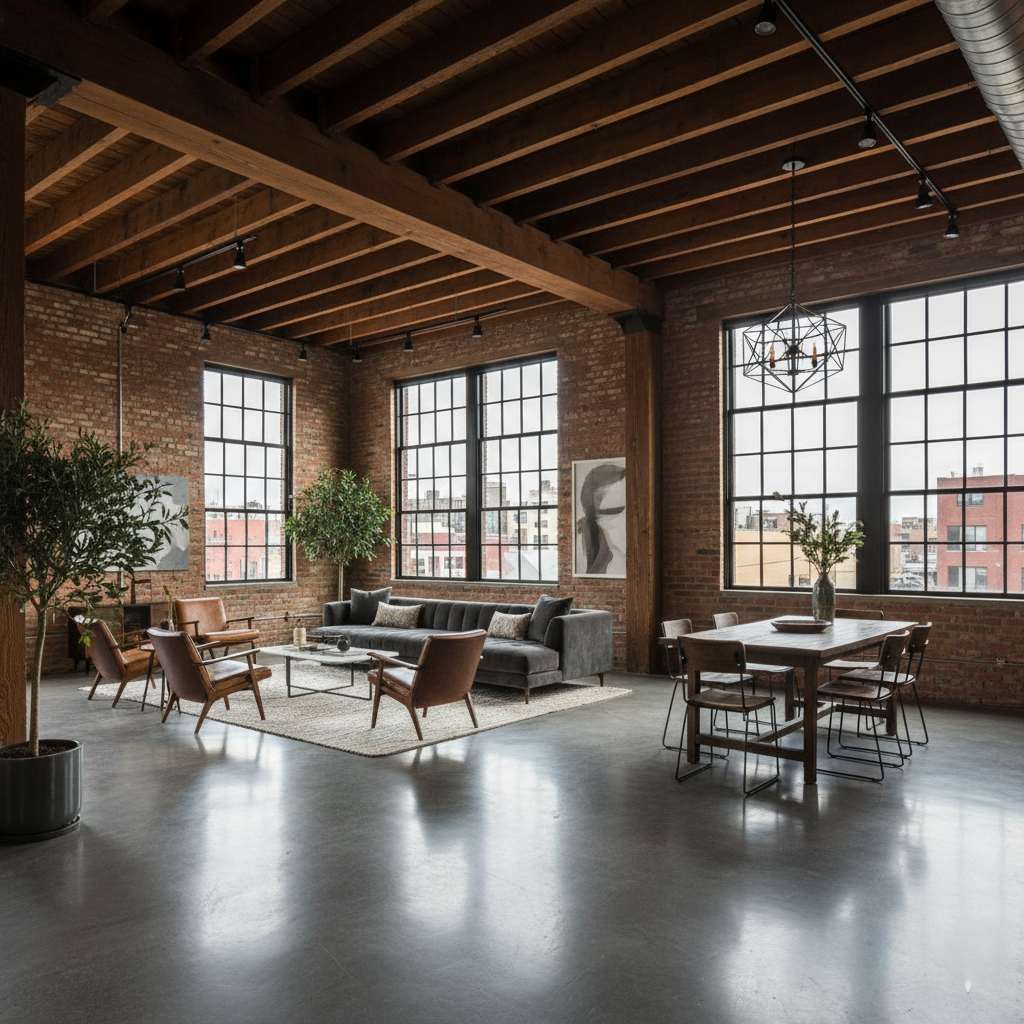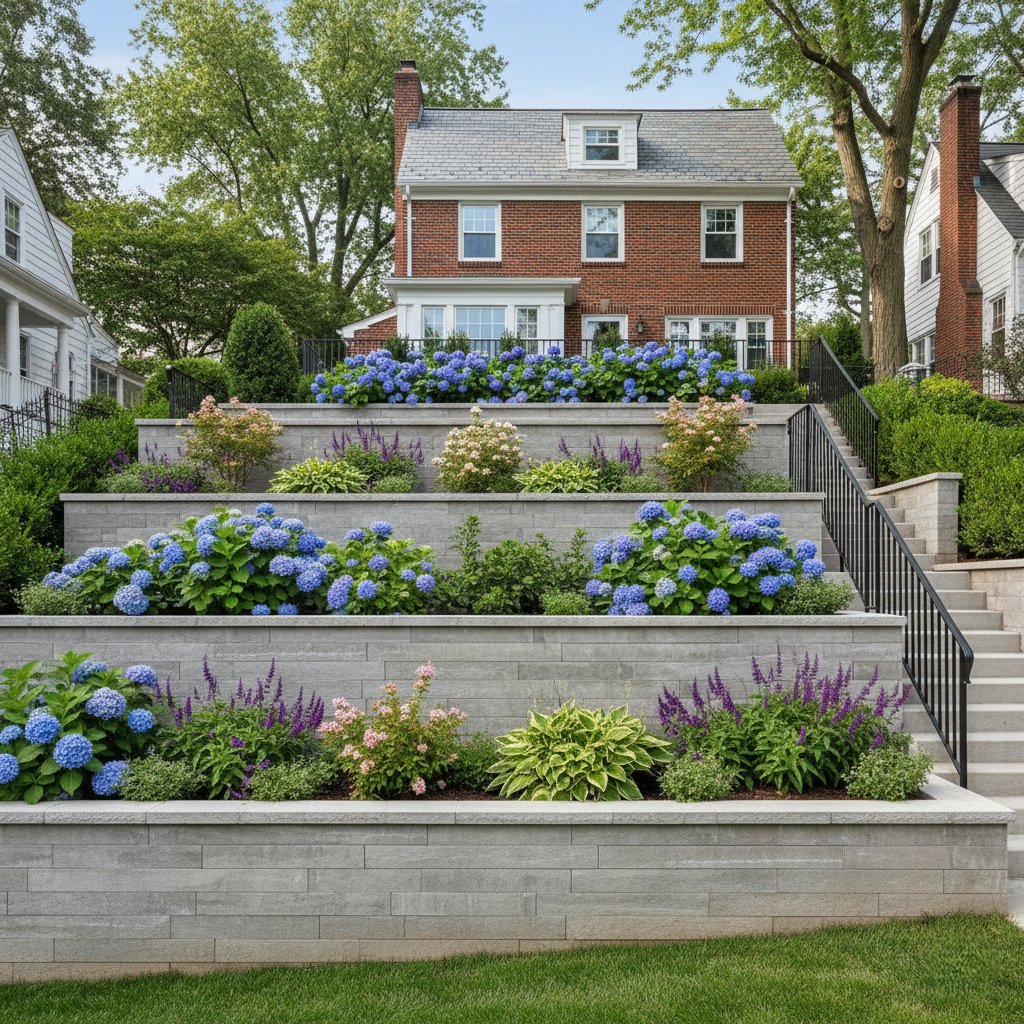
Regulatory Compliance for Decorative Concrete in Union City, NJ
Decorative Concrete Union City
Ensuring compliance with the required regulations of decorative concrete installations in Union City will guarantee a smooth process for completing the installation while complying with local laws and safety standards. Decorative concrete installations are governed by the New Jersey Uniform Construction Code (NJUCC), which is a framework that outlines comprehensive standards for all aspects of concrete construction in the state of New Jersey. In addition to the NJUCC, there may be additional local ordinances and zoning requirements that property owners will need to comply with before commencing their decorative concrete installation. A professional contractor who is knowledgeable about the Union City regulatory structure can assist in navigating the complex process of obtaining permits, as well as ensure compliance with accessibility standards and building codes. Documenting your project properly and adhering to the established procedures will provide you with the necessary protection against future legal problems or project delays.

Decorative Concrete Installation Requirements
Most decorative concrete installations in Union City require building permits to ensure public safety and the integrity of structural components such as walls, foundations, and floors. Permits are also required to regulate drainage patterns and public right-of-way areas. To initiate the permit application process, applicants must submit detailed project plans to the Building Department for review, including specifications related to decorative elements, drainage, and/or stormwater management provisions, and accessibility features. Project plans must contain accurate measurements, setback calculations, and compliance documentation to enable city officials to determine whether to approve or reject the application.
Building Department and Regulatory Requirements
Union City adopts the New Jersey Uniform Construction Code as its basis for building permits and local amendments as needed to satisfy local concerns. A typical building permit application will include Form F-100, which is the standard building permit application form adopted by New Jersey, as well as any subcode forms that are applicable to building, electrical, plumbing, and fire safety aspects of the project. Generally speaking, a building permit is required for all decorative concrete installations unless otherwise exempted, although a building subcode review is typically the only subcode review requirement for decorative concrete projects, unless the project is highly complex and requires one or more additional subcode reviews.
Residential vs. Commercial Decorative Concrete Projects
For single-family residential decorative concrete projects, homeowners may prepare their own drawings for owner-occupied properties; however, preparing professional drawings for commercial projects and complex residential projects is recommended to ensure compliance with the building code and to expedite the approval process. For either residential or commercial projects, the applicant must provide the Building Department with sufficient information regarding the project, including an indication of how the project will meet the New Jersey Uniform Construction Code.
Permit Fees
Permit fees vary depending on the complexity and scope of the project. The fees charged by the Building Department are determined by the State of New Jersey and are adjusted periodically to reflect any changes to state requirements. For basic residential decorative concrete projects, the permit fees can range from $100-$500, whereas commercial decorative concrete projects can have much higher permit fees depending on the size and complexity of the project. The Building Department maintains a list of the most current fee schedules and provides this information to the public.
Plan Review and Approval Process
The plan review process utilized by the Building Department involves a multi-disciplinary approach to review various aspects of the proposed decorative concrete installation. In addition to verifying that the structural component(s) of the proposed decorative concrete installation meet the New Jersey Uniform Construction Code, the Building Department will review the drainage impact of the proposed decorative concrete installation and any utility-related concerns. The length of time required to complete the review process typically ranges from 10 to 15 working days after receipt of a complete application with all required information.
Zoning Compliance and Setback Requirements
In order to obtain a building permit for a decorative concrete project in Union City, the property owner must first obtain zoning approval. Before issuing a building permit, the City of Union City will not issue a building permit for any decorative concrete project until zoning approval has been obtained. The City of Union City’s zoning ordinance establishes the requirements for impervious coverage, setbacks, and permitted uses of decorative concrete installations. Property owners must demonstrate compliance with the zoning ordinance before obtaining a building permit.
Impervious Coverage Calculations
All surfaces that prevent water infiltration are considered impervious surfaces. Examples of impervious surfaces include decorative concrete patios, driveways, walkways, and pool decks. The amount of impervious coverage allowed varies among Union City’s residential zoning districts. Typically, residential zoning districts have impervious coverage limitations of 20-40%. Impervious coverage limitations may need to be addressed through a variance application to the Zoning Board of Adjustment if exceeded.
Setbacks
Setbacks are the minimum distance a decorative concrete installation must be located from the property line, adjacent structure, or easement. Union City’s development standards dictate minimum setback distances that vary by zoning district and project type. Setbacks serve two purposes: to protect sightlines and maintain neighborhood character (front yard); and to provide adequate space between properties (side and rear yards). Survey documentation is required to demonstrate compliance with setback requirements. Accurate measurements from the property lines to the proposed decorative concrete locations must be provided to zoning officers. Professional surveys are recommended due to the need for precise measurement to achieve permit approval. Discrepancies between the survey documentation and the field conditions must be resolved before permit issuance.
Variance Application Procedure
When compliance with zoning requirements would result in unnecessary hardship to the property owner, a variance application may be submitted to the Zoning Board of Adjustment. Variance applications involve a formal hearing process and significant fees that most property owners prefer to avoid. Professional design services can often modify decorative concrete plans to achieve compliance with the zoning ordinance without the need for a variance application.
Stormwater Management Requirements
Union City regulates the impacts of decorative concrete installations on the City’s drainage system. Larger decorative concrete installations or installations that impact the drainage system of a particular area may be required to demonstrate compliance with the State of New Jersey’s stormwater management rules. Detention basins, infiltration systems, and other mitigation measures may be required to mitigate the impacts of decorative concrete installations on the City’s drainage system.
Accessibility Requirements and the Americans with Disabilities Act (ADA)
The Americans with Disabilities Act (ADA) requires that decorative concrete installations installed in public accommodations, commercial establishments, and government buildings in Union City comply with the technical requirements established by the 2010 ADA Standards. Residential projects may also require compliance with the 2010 ADA Standards if they provide public functions or accommodate disabled residents. Decorative concrete installations must meet the technical requirements established by the 2010 ADA Standards for accessible routes, surface materials, slopes, and transitions.
Accessible Route Specifications
Specifications for accessible routes include the following:
- Decorative concrete walkways: Maximum slope of 1:20 (5%);
- Ramps: Maximum slope of 1:12 (8.33%), with level landings at specified intervals.
Surface Texture Specifications
Specifications for surface texture include the following:
- Decorative concrete walkways: Slip-resistant surface texture;
- Decorative concrete ramps: Stable and firm surface texture under foot traffic.
Decorative Treatments
While there are several decorative treatment options available for decorative concrete installations, none of these options may compromise the basic requirements for accessible routes and surface textures.
Curb Ramp Construction Specifications
Specifications for curb ramp construction include the following:
- Running slope: 1:12 (8.33%);
- Cross slope: Not to exceed 2%;
- Flare angles: 30 degrees;
- Landing dimensions: Comply with New Jersey Department of Transportation accessibility guidelines.
Transitions Between Different Surfaces
Transitions between different surface materials must provide a smooth connection to prevent tripping hazards and maintain accessibility. Decorative concrete installations must be coordinated with existing surfaces to provide smooth transitions between different surface materials. These requirements primarily affect decorative concrete projects that connect to existing sidewalks, building entrances, or parking areas.
Ongoing Accessibility Requirements
Even after decorative concrete installations are completed, commercial facilities must continue to assess their decorative concrete features to ensure compliance with accessibility requirements. If non-compliant features are identified, the facility must take corrective action to bring the feature into compliance. Regular accessibility audits can identify potential issues before they become compliance problems.
Public Right-of-Way Requirements
Decorative concrete work in the public right-of-way in Union City requires special permits and compliance with the municipality’s specifications. Public right-of-way decorative concrete projects must meet enhanced durability requirements, accessibility requirements, and aesthetic guidelines that preserve the character of the neighborhood. The City of Union City coordinates with city engineering staff to ensure that public right-of-way decorative concrete projects are properly integrated with existing infrastructure and utilities.
Environmental and Safety Requirements
Environmental protection requirements relate to decorative concrete installations through soil erosion controls, dust management, and waste disposal regulations. The City of Union City enforces New Jersey’s Soil Erosion and Sediment Control Act for decorative concrete projects that disturb over 5,000 square feet of land, which requires a detailed erosion control plan and implementation measures. While smaller decorative concrete projects do not fall under the Soil Erosion and Sediment Control Act, property owners must still take reasonable measures to prevent soil erosion and sediment discharge.
Dust Management Requirements
During decorative concrete surface preparation, property owners and contractors often perform grinding, cutting, or sandblasting operations that generate dust. Union City regulates dust generation by requiring property owners and contractors to implement dust suppression techniques to protect neighboring properties and to meet the City’s air quality standards. Professional contractors utilize specialized equipment and techniques to minimize dust generation and to control airborne particles.
Waste Disposal Requirements
Decorative concrete waste must be disposed of in accordance with the New Jersey Solid Waste Management Regulations. Decorative concrete is classified as construction and demolition debris that must be handled and disposed of properly. There are several options for recycling decorative concrete waste, and many municipalities, including Union City, encourage or require the recycling of construction and demolition debris to reduce landfill impacts. Contractors must maintain records of waste disposal methods and destinations.
Chemical Admixtures and Sealers
Chemical admixtures and sealers used in decorative concrete installations must be used in accordance with environmental, health, and safety regulations. Volatile Organic Compound (VOC) limits restrict the use of certain sealer types, while groundwater protection requirements may limit the use of chemicals in sensitive areas. Professional contractors are aware of these regulations and can select the most suitable materials for decorative concrete installations.
Noise Ordinance Requirements
Union City regulates the hours during which decorative concrete work can occur, especially when using noisy equipment such as concrete saws or surface grinders. Decorative concrete work can typically only occur during daylight hours on weekdays, with some limited hours on weekends. Emergency repairs may be exempt from the noise ordinance; however, routine decorative concrete work must comply with the noise ordinance.
Utility Location Requirements
Before commencing any excavation work for decorative concrete, property owners and contractors must contact New Jersey 811 to locate underground utilities. New Jersey 811 provides free services to identify and mark underground utilities to prevent damage to the utilities during construction. Property owners and contractors must allow 48-72 hours for utility marking before commencing excavation work.
Inspection Requirements and Procedures
The Building Department performs inspections to ensure that decorative concrete installations comply with approved plans and applicable codes throughout the construction process. The required inspections for decorative concrete installations typically include a foundation/excavation review, a reinforcement placement verification, and a final installation approval. Contractors must schedule inspections at least 24 hours in advance and ensure that the project is ready for inspection at the designated time.
Foundation Inspection
A foundation inspection verifies that the decorative concrete installation has been excavated to the correct depth, that the base material has been installed correctly, and that the formwork has been placed correctly before placing the concrete. Inspectors will examine the drainage provisions, the reinforcement, and the compliance with the approved plans. Deficiencies identified during the inspection must be corrected before proceeding with the next phase of construction.
Reinforcement Inspection
A reinforcement inspection verifies that the decorative concrete installation has been reinforced with the correct type, size, spacing, and support of steel as specified in the engineering specifications and code requirements. Reinforcement inspections are required for decorative concrete installations that require structural reinforcement to meet approved design criteria.
Final Inspection
The final inspection evaluates the completed decorative concrete installation for compliance with approved plans, accessibility requirements, and applicable codes. Inspectors examine the finished surface of the decorative concrete installation, the drainage function of the decorative concrete installation, the safety features of the decorative concrete installation, and the overall quality of construction. Upon successful completion of the final inspection, the Building Department will issue a Certificate of Completion or a Certificate of Occupancy, depending on the nature of the project.
Specialized Inspections
Some decorative concrete installations may require specialized inspections for complex decorative concrete installations that include structural elements, accessibility features, or public safety concerns. Specialized inspections typically involve inspectors who possess expertise in decorative concrete applications and requirements. Professional contractors will coordinate with the Building Department to ensure that the required inspections are completed promptly.
Certificate of Occupancy
Upon completion of the final inspection, the Building Department will issue a Certificate of Occupancy for commercial projects or a Certificate of Completion for residential projects. The Certificate of Occupancy is proof that the completed decorative concrete installation has complied with all applicable codes and approved plans.
Professional Contractor Requirements
To ensure compliance with all regulatory requirements, decorative concrete contractors performing decorative concrete work in Union City must maintain current licenses, bonds, and insurance coverage as required by the State of New Jersey. The New Jersey Division of Consumer Affairs is responsible for regulating and overseeing contractor licensing and registration to ensure competence and adherence to ethics in the industry. It is recommended that property owners verify the credentials of the contractor prior to initiating decorative concrete work.
Business Registration Requirements
Contractors performing decorative concrete work in Union City must register with the New Jersey Division of Revenue and Enterprise Services. Registration with the Division of Revenue and Enterprise Services ensures that contractors adhere to state tax laws and business regulations, and provides property owners with a recourse mechanism in case of a problem with contractor performance.
Insurance Requirements
Property owners and the general public are protected from potential liabilities associated with decorative concrete construction by the insurance coverage maintained by decorative concrete contractors. Insurance coverage requirements for decorative concrete contractors typically include General Liability, Workers’ Compensation, and Vehicle Insurance. Most professional contractors maintain insurance coverage in excess of the minimum requirements to provide greater protection.
Bonding Requirements
Bonding requirements for decorative concrete contractors provide financial protection for property owners in the event the contractor fails to complete the project in accordance with the contract terms. Surety bonds guarantee the completion of the project or provide funds for remediation if the contractor defaults on their obligation. Many professional contractors maintain bonding capacity that exceeds the requirements for each project.
Continuing Education Requirements
Continuing education courses are required for decorative concrete contractors to remain current with new codes, technologies, and best practices in decorative concrete installation. Professional organizations and trade associations provide continuing education opportunities to assist contractors in maintaining their competencies and staying informed of changes in regulations.
Quality Assurance and Warranty Requirements
Professional contractors providing decorative concrete installation services will provide warranty coverage for decorative concrete installations that meet or exceed the minimum requirements established by Union City. The warranty coverage typically includes materials, workmanship, and performance for a period of time after completion of the project. Property owners should be aware of the warranty terms and requirements to ensure continued coverage.
Regulatory Compliance Records and Documentations
Documentation is an important tool in proving that a decorative concrete contractor has followed local regulations during the course of a decorative concrete project. In addition, Union City requires a record of permits granted to the contractor, records of inspections performed on the completed installation, and certificates of compliance issued by the permitting authority. The property owner shall be responsible for maintaining all records associated with the decorative concrete installation to demonstrate compliance at a later date, if required, and to assist with any modifications or additions to the original decorative concrete installation.
The permit file contains a copy of the original application filed with the City, the approved plan(s), records of inspections performed on the site, and a certificate of completion, which verifies that the decorative concrete installation was built in compliance with the relevant ordinances. All of these documents are very important when there is a transfer of ownership of the property, when filing an insurance claim related to the decorative concrete installation, and/or when planning for future modification to the decorative concrete installation. It is common for professional contractors to deliver a comprehensive documentation package to the client upon completion of the project.
Certifications of materials and test results are proof of compliance with specification requirements and performance requirements for decorative concrete installations. Certification and test documentation may be especially important for large-scale commercial projects or decorative concrete installations that have specific performance requirements. By maintaining certification and test documentation, the property owner can make warranty claims related to the decorative concrete installation and also make informed decisions regarding maintenance of the decorative concrete installation.
At Union City Concrete Works, our knowledgeable staff will help guide you through the complexities of the regulatory environment that governs decorative concrete installations in Union City. We handle all aspects of the permitting process for your decorative concrete installation, including preparation and submittal of the permit application, compliance documentation, and scheduling and coordinating inspections to ensure that your decorative concrete installation meets all of the applicable requirements established by the City of Union City. We also work closely with the City of Union City officials and other regulatory agencies to expedite the approval process for your decorative concrete installation while providing you with a decorative concrete installation that exceeds both aesthetically pleasing and compliant expectations.


